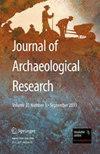烹饪和食品制作的考古研究
IF 4.1
1区 历史学
Q1 ANTHROPOLOGY
引用次数: 0
摘要
几十年来,饮食文化一直是考古研究的一个组成部分。然而,烹饪和食物准备作为可以揭示厨房以外生活的社会信息的具体行为,直到最近才成为考古学研究的重点。回顾有关烹饪和食物准备的文献,可以发现与以往有关生存策略、消费和盛宴的研究相比,烹饪和食物准备已经发生了转变。新的研究之所以与众不同,是因为提出了社会问题,将重点转向准备和生产而不是消费,以及关注边缘化人群及其日常经历。文献所涉及的理论视角围绕着实践、代理和性别。因此,烹饪和准备食物这一新的考古研究重点是以人类学为基础的。本文章由计算机程序翻译,如有差异,请以英文原文为准。
Archaeological Studies of Cooking and Food Preparation
Foodways have been a component of archaeological research for decades. However, cooking and food preparation, as specific acts that could reveal social information about life beyond the kitchen, only became a focus of archaeological inquiry more recently. A review of the literature on cooking and food preparation reveals a shift from previous studies on subsistence strategies, consumption, and feasting. The new research is different because of the social questions that are asked, the change in focus to preparation and production rather than consumption, and the interest in highlighting marginalized people and their daily experiences. The theoretical perspectives the literature addresses revolve around practice, agency, and gender. As a result, this new focus of archaeological research on cooking and preparing food is grounded in anthropology.
求助全文
通过发布文献求助,成功后即可免费获取论文全文。
去求助
来源期刊

Journal of Archaeological Research
Multiple-
CiteScore
10.20
自引率
7.90%
发文量
9
期刊介绍:
Journal of Archaeological Research publishes the most recent international research summaries on a broad range of topics and geographical areas. The articles are intended to present the current state-of-the-discipline in regard to a particular geographic area or specific research topic or theme. This authoritative review journal improves access to the growing body of information and literature through the publication of original critical articles, each in a 25-40 page format.2-Year Impact Factor: 4.056 (2017) 5-Year Impact Factor: 4.512 (2017)2 out of 85 on the Anthropology listIncluded in the European Reference Index for the Humanities (ERIH) PLUS The European Reference Index for the Humanities and the Social Sciences (ERIH PLUS) was created and developed by European researchers under the coordination of the Standing Committee for the Humanities (SCH) of the European Science Foundation (ESF). https://dbh.nsd.uib.no/publiseringskanaler/erihplus/about/indexSCImago Journal and Country Rank (SJR) 2018: 1.7102 out of 263 on the Archeology (Arts and Humanities) list3 out of 254 on the Archeology list2 out of 131 on the General Arts and Humanities listSJR is a measure of the journal’s relative impact in its field, based on its number of citations and number of articles per publication year.Source Normalised Impact per Paper (SNIP) 2018: 2.112The SNIP measures contextual citation impact by weighting citations based on the total number of citations in a subject field. The impact of a single citation is given higher value in subject areas where citations are less likely, and vice versa.CiteScore 2018: 3.86Rated ''A'' in the Australian Research Council Humanities and Creative Arts Journal List. For more information, visit: http://www.arc.gov.au/era/journal_list.htm
SCImago Journal and Country Rank (SJR) 2011 1.227 Archeology 1 out of 96 Archeology (Arts and Humanities) 1 out of 59 Arts and Humanities (miscellaneous) 1 out of 243
 求助内容:
求助内容: 应助结果提醒方式:
应助结果提醒方式:


